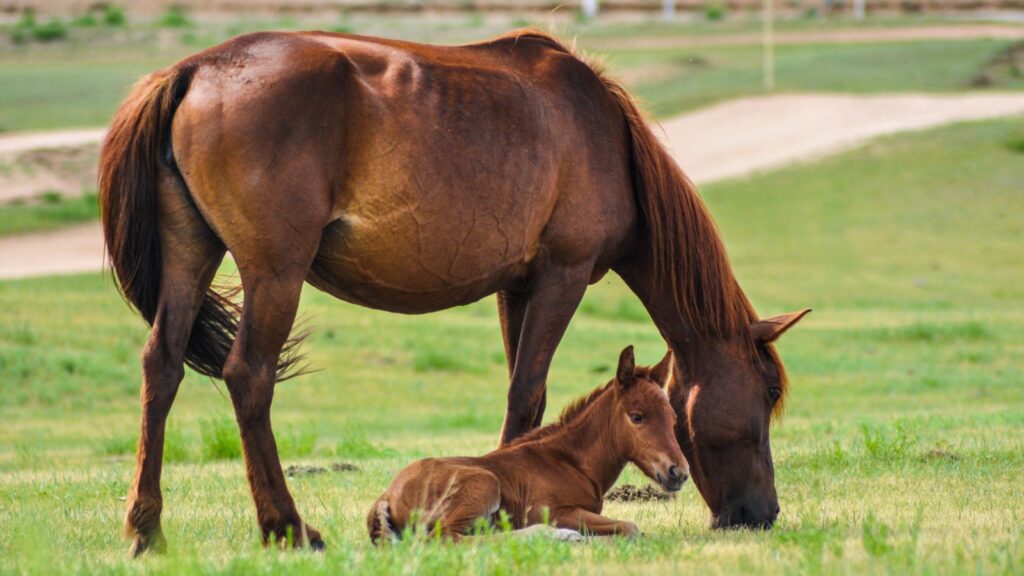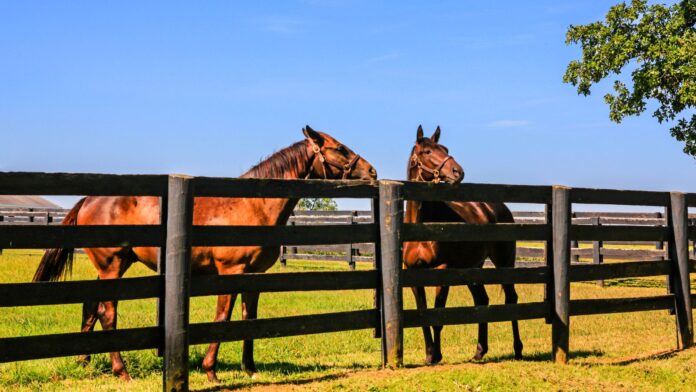Horse farming has recently emerged as a promising approach for sustainable agriculture, offering both economic and environmental benefits. By harnessing the natural power of these magnificent animals, farmers can reduce their reliance on fossil-fuel powered machinery and improve soil health, all while practicing responsible land conservation techniques.
In this insightful blog post, we’ll explore the numerous advantages of incorporating horses into your agricultural endeavors and provide you with essential information to get started with horse farming.
Key Takeaways
- Horse farming can significantly reduce reliance on non – renewable resources and decrease greenhouse gas emissions, making it a promising approach for sustainable agriculture.
- Horses provide natural fertilizer that improves soil health and promotes crop growth, while also offering an eco-friendly alternative to synthetic fertilizers.
- Careful breed selection, proper care and management techniques, effective training strategies, grazing management practices, composting techniques, and the use of horse-powered equipment are crucial in integrating horses into a sustainable agricultural system.
The Benefits Of Horse Farming For Sustainable Agriculture
Horse farming offers numerous benefits for sustainable agriculture, including reduced environmental impact, natural fertilizer production, improved soil health, land conservation and cost savings.
Natural Fertilizer
Horse farming is an excellent source of natural fertilizer for sustainable agriculture. Horses produce plenty of manure, which can fertilize fields without using synthetic chemicals that harm the environment and soil health.
Horse manure is rich in nitrogen, phosphorus, and potassium – all essential nutrients for crop growth. In comparison to synthetic fertilizers, horse manure improves soil quality by promoting biological activity in the soil.
Additionally, composting horse manure reduces greenhouse gas emissions and helps minimize waste from farms while producing a valuable soil amendment for use on crops.
Improved Soil Health
Integrating horse farming into a sustainable agriculture system can have significant benefits for soil health. Horses leave behind natural fertilizer in the form of manure, which enriches the soil with essential nutrients and improves its overall health.
In addition to providing natural fertilizer, horses also offer an alternative to mechanical tillage that can be damaging to soil structure. Horse-drawn plows or cultivators are gentler on the soil surface and do not compact the ground like heavy machinery does, allowing for better air circulation and water retention.
By improving soil health through responsible horse farming practices such as proper manure management, grazing management, composting, and reduced tillage needs, farmers can help ensure long-term agricultural sustainability while reducing their environmental impact.
Land Conservation
Horse farming offers a sustainable approach to land conservation. Unlike heavy machinery that can compact soil and disrupt its ecosystems, horses’ hooves gently aerate the earth, improving its structure and drainage while promoting healthy plant growth.
Moreover, horse grazing systems help maintain open areas such as pastures and meadows, which would otherwise be vulnerable to ecological succession or development. This preservation enables diverse wildlife habitats while creating an opportunity for farmers to utilize these areas for livestock grazing or crop production without damaging delicate terrain.
Reduced Costs
Implementing horse farming techniques can lead to significant cost savings in sustainable agriculture. With the use of draft horses, farmers can forego expensive fuel-powered machinery and instead utilize the natural power of these gentle giants.
Horses are also capable of cultivating fields with precision, reducing crop damage and waste. In addition to saving on equipment costs, horse manure is a valuable natural fertilizer that can help reduce expenses associated with purchasing commercial fertilizers.
The Basics Of Horse Farming
Choose the right breed of horse, provide proper care and management, train and handle them effectively, and benefit from horse-powered equipment.
Choosing The Right Breed Of Horse
When it comes to choosing the right breed of horse for farming, there are several factors to consider. Draft horses, like Belgians or Percherons, are commonly used for farm work due to their size and strength.
It’s important to select a breed that is suited to the climate and terrain of your farm. For example, if you live in a hot and humid area with hilly or mountainous terrain, a draft breed like the Clydesdale may not be suitable due to their thick coats.
Ultimately, selecting the right breed depends on your individual needs and preferences.
Proper Care And Management Of Horses
Taking proper care of horses is crucial for their health, happiness, and performance on the farm. It involves providing them with adequate food, water, shelter, medical attention when needed and regular grooming.
Feeding should be done based on the horse’s age, breed, activity level and temperature conditions.
Grooming includes brushing hair coats regularly to remove loose hair and dirt. This helps prevent skin infections as well as promotes healthy coats which can protect a horse from harsh weather conditions like winter cold or summer heatwaves.
If you plan on using horses for farming activities like plowing or pulling carts then they need specialized training that helps them learn how to obey commands without getting hurt in the process.
Training And Handling Horses
Proper training and handling are crucial to successfully working with horses in sustainable agriculture. Horses can be trained for a variety of tasks, including plowing fields, planting crops, and transporting goods.
When handling horses, always approach them calmly and confidently. Establishing trust between you and the horse is key to ensuring a productive work relationship. Positive reinforcement techniques such as treats or verbal praise can help reinforce good behavior.
Training methods should focus on building trust, establishing boundaries, and reinforcing positive behaviors.
Using horses in sustainable agriculture offers many benefits, but it does require specific knowledge about equine husbandry practices.
Benefits Of Horse-Powered Equipment
Using horse-powered equipment offers a variety of benefits for small-scale, sustainable farmers. Unlike tractors and other mechanized tools, horses are gentle on the soil and don’t compact it as much, improving soil health over time.
Horses also have less impact on the environment since they don’t require fossil fuels to run and produce minimal emissions. Additionally, using horses for plowing or cultivating can be a cost-effective alternative that doesn’t rely on expensive machinery or fuel costs.
Did you know that in some cases, two draft horses can replace a tractor? By pulling implements like plows or cultivators with the help of skilled handlers, these animals can get work done just as efficiently without imposing additional burdens on the ecosystem around them.
In addition to being more sustainable than gas-guzzling machines, equine labor helps cultivate greater independence from external resources which may not always be immediately available in an off-grid setting.
Sustainable Practices In Horse Farming
Implementing sustainable practices in horse farming, such as effective grazing management, manure composting, and alternative power sources can not only benefit the environment but also contribute to a successful and profitable small farm.
Grazing Management

Proper grazing management is essential for successful horse farming in sustainable agriculture. Grazing management involves controlling the amount of time a horse spends on a particular area, rotating grazing areas to avoid overgrazing, and monitoring grass growth.
To ensure efficient grazing management, farmers need to take into consideration factors such as climate conditions and land topography. One strategy is implementing a rotational grazing system where horses are moved between different pastures regularly.
Additionally, utilizing equine-grazed areas for hay or silage production can provide additional feed sources during colder months when fresh grass may not be available.
Manure Management And Composting
Proper manure management is a crucial aspect of any sustainable farming practice, and it becomes even more important when using horses for farm work. Horse manure contains essential nutrients that can benefit soil health, but overapplication can lead to nutrient imbalances and pollution.
Effective composting is the solution to these issues. Composting breaks down the horse manure into an organic fertilizer that can be used to nourish crops in a natural way.
This method not only reduces waste but also helps improve soil quality, root development, and overall plant growth while reducing the use of chemical fertilizers.
Horse farmers should consider investing in equipment such as dump trailers or spreaders designed for effective handling of this valuable resource. Proper techniques like turning the pile regularly will aid faster decomposition while keeping odors under check.
It’s essential to maintain good hygiene around livestock areas by ensuring regular cleaning and collecting manure diligently.
Energy Efficiency And Alternative Power Sources
Horse farming is not just environmentally-friendly, it’s also a great way to incorporate alternative power sources into your off-grid lifestyle. By utilizing horses instead of tractors, you can reduce your reliance on fossil fuels and lower your carbon footprint.
But there are also other ways to integrate alternative power sources into horse farming. For example, some farmers have used solar panels to provide electricity for electric fences or lighting in their barns.
Others have experimented with using biofuels made from crops grown on their own farms as an energy source for machinery.
Integrating Horse Farming Into A Sustainable Agriculture System
Incorporating horse farming into a sustainable agriculture system can lead to improved soil health, natural pest control, and water conservation.
Crop Diversity And Companion Planting
Crop diversity and companion planting are essential components of sustainable agriculture when incorporating horse farming. Companion planting involves growing different types of crops together to maximize resources such as sunlight, water, and nutrients.
This technique helps to increase crop productivity while reducing pest problems and promoting soil health.
Incorporating multiple crops also provides more food options and reduces the risk of total crop loss due to disease or pests. Additionally, rotating crops within a field helps prevent nutrient depletion in soil over time, leading to healthier plants with higher yields.
Using horses for farming allows farmers to diversify their crops without damaging the land through excessive tilling or relying on chemical inputs like pesticides and synthetic fertilizers.
Soil Building And Cover Crops
One of the key benefits of horse farming for sustainable agriculture is improved soil health. Horses can help build up the soil and make it more fertile by grazing on land, naturally fertilizing it with their manure.
Additionally, utilizing cover crops can also improve soil quality by adding organic matter and increasing nutrient availability.
Improving soil health through horse farming can have a positive impact on crop yields and overall farm productivity. By rotating crops and using cover crops, farmers can maintain healthy soils that support a wide range of plants while reducing erosion and minimizing pollution from runoff.
Water Conservation And Irrigation
One of the biggest concerns for sustainable agriculture is efficient water use. In horse farming, there are several practices that can help conserve and manage water resources.
One strategy is to implement a rainwater harvesting system to collect and store water for irrigation during dry periods. Another approach is to improve soil quality using cover crops, which not only increase organic matter but also retain moisture in the soil.
Additionally, proper pasture management techniques such as rotational grazing can reduce erosion and enhance infiltration, allowing plants to absorb more water while preventing runoff.
Natural Pest Control
Using horses for farming can also provide a natural and sustainable way to control pests in crops. Rather than relying on chemical pesticides, farmers can harness the natural grazing habits of horses to keep weeds at bay and prevent insect infestations.
For example, horses naturally graze on taller plants like thistles that are often avoided by other livestock, which helps manage weed growth without the need for herbicides.
One study even showed that farms using horse-drawn equipment had fewer pest problems than those using tractors due to the lighter compaction of soil from hooves leading to increased soil health and microbial activity.
Challenges And Solutions For Horse Farming In Sustainable Agriculture
Labor-intensive work can be a significant challenge for horse farming, but it can be mitigated by incorporating practices such as rotation grazing and using appropriate equipment.
Animal welfare concerns could also arise, so close attention must be given to ensuring horses’ health and well-being on the farm.
Labor-Intensive Work
Farming with horses involves a lot of physical labor, and it’s important to be prepared for the responsibility that comes with it. Horses require daily care such as feeding, grooming, and exercise, which can be time-consuming but incredibly rewarding.
Since horse farming is done primarily by hand, tasks like plowing fields or harvesting crops can take longer than if you were using machinery. However, working with horses allows you to connect more closely with nature and experience the satisfaction of growing your own food in an environmentally sustainable way.
Animal Welfare Concerns
As with any type of animal husbandry, maintaining the welfare of horses should be a top priority for those involved in horse farming. This includes providing proper nutrition, access to clean water, and adequate shelter from the elements.
Working with draft animals requires good communication skills between the farmer and horse. Training is key in ensuring that both the farmer and animal are comfortable and safe during work sessions.
Additionally, it is important to ensure that your horses are not overworked or pushed beyond their physical limits.
Incorporating sustainable practices into horse farming operations can help improve animal welfare while reducing environmental impacts on surrounding ecosystems.
Access To Land And Resources
One of the main challenges in horse farming for sustainable agriculture is access to land and resources. Many small farmers struggle with acquiring enough land to support a horse-powered farm, as horses require more space to graze compared to traditional farming methods.
However, there are solutions available for those willing to put in the effort. Some farmers have found success through collaborations with other small farms or community groups that offer shared resources such as land and equipment.
Others have utilized conservation programs that provide funding or tax incentives for sustainable agriculture practices like horse farming.
Collaboration With Experts
Collaborating with experts can be essential when adopting horse farming for sustainable agriculture. By working with organizations and professionals in the field, farmers can gain valuable insights into equine husbandry and grazing management.
Experts in organic farming, pasture management, animal welfare, and equine breeding can help farmers understand how best to integrate horses into their agricultural practices.
Farmers can also benefit from consulting with local veterinarians who specialize in treating draft animals; this ensures that they provide proper care for their horses throughout the farming season.
Conclusion
In conclusion, horse farming offers numerous benefits for sustainable agriculture, including reduced environmental impact, natural fertilizer, improved soil health, and land conservation.
By incorporating horses into your farm’s energy system and utilizing them as a cost-effective alternative to tractors or tillers, you can not only save money but also reduce your carbon footprint.
However, it is crucial to carefully consider the long-term commitments involved in adopting horse-drawn farming and invest in appropriate equipment tailored to working with these animals.
FAQs:
1. What are some benefits of horse farming for sustainable agriculture?
Horse farming can provide many benefits for sustainable agriculture, including reduced environmental impact compared to industrial farming methods, natural fertilization from manure and urine, lower fuel costs, and increased biodiversity on the farm.
2. How do horses help with soil conservation?
By plowing fields and tilling soil naturally using their hooves rather than heavy machinery, horses can help prevent soil erosion while reducing compaction that can make it harder for plants to grow.
3. What types of crops are commonly grown on horse farms?
Since horses require a diet rich in hay or pasture grasses, many horse farms focus on growing these crops as well as grains like oats or corn that can be used to supplement their feed.
4. Can small-scale farmers benefit from incorporating horses into their operations?
Absolutely! Horse-powered equipment is often more affordable than large tractors or other machines typically used in industrial agriculture and can also offer greater flexibility when it comes to managing smaller plots of land or working around obstacles such as trees or rocks. Plus, since they don’t run on fossil fuels – they’re great for sustainability goals too!




